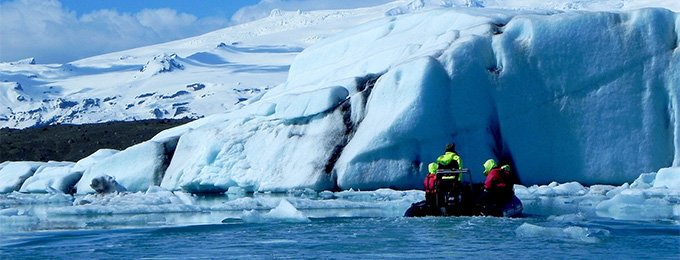A step towards better international collaboration in Artic research, as 25 countries including Switzerland sign a new agreement on the topic.
Research on the Arctic and polar science in general is a field, which particularly requires international cooperation. Scientific expeditions to the poles are both costly and logistically complex. It thus pays off to have dozens of researches from all over the globe embark on the same boat in order to collect samples and data from polar areas. Alternatively, researchers can openly share this hard to obtain data with other scientists. Global awareness on the importance of preserving the North and South Pole regions has helped researchers highlight their crucial role in the protection of the icecap, making it a concern of policy makers.
On Sunday 9 May, a new milestone in international collaboration on Arctic research was reached, with the signature of the 3rd Arctic Science Ministerial Joint Statement on ‘Knowledge for a Sustainable Arctic’. Twenty-five countries and the European Union signed the agreement, identifying four areas in which action is the most needed for preserving the Arctic:
- Observe: implementing observation networks and data-sharing. This objective focuses on ways to gather and share high quality data on Arctic systems, sustaining current networks and developing new ones, especially for geospatial mapping of the Arctic.
- Understand: enhancing understanding and prediction capability on Arctic environmental and social systems and on the global impact of climate changes. This target should be reached by strengthening international cooperation, building on successful collaborative research projects and fostering global expertise.
- Respond: operationalising sustainable development, evaluating vulnerability and resilience, and applying knowledge. This objective addresses the mitigation of the impact of climate change in the Arctic through international actions and consideration of traditional and indigenous knowledge.
- Strengthen: preparing the next generation through capacity building, education, networking and resilience. This target addresses the special needs of education for Arctic researchers, building on existing networks and associations.
The Joint Statement emerged from a series of workshops organised by the Arctic Science Ministerial, in which 28 countries, 16 international organisations and 6 associations representing indigenous people from the region, debated on the best way to collaborate on Arctic research.
Switzerland is one of the signatories of this Joint Statement. The agreement follows on a national boost for polar science, as the Confederation just named the Swiss Polar Institute (SPI) a ‘Research Facility of national importance’ for the 2021-2024 period. The institute, created in 2016, operates as a service and logistics provider for Swiss Polar research. As such, it caters for scientists from numerous institutions in Switzerland, including ETH Zurich, EPFL, the Swiss Federal Institute for Forest, Snow and Landscape Research (WSL) and several cantonal universities. The institute provides funding instruments, which are complementary to national or European opportunities, focused on access to the field, services, courses and community building. Therefore, the SPI does not fund research strictly speaking, but provides support through the Polar access fund, technogrants and its new Flagship initiatives. This way, the SPI aims to increase Swiss activities in the Arctic and Antarctica, and foster international collaboration, so that the country does not lag behind its international partners on the topic. On top of that, Swiss environmental scientists have acquired valuable knowledge on high altitude environments thanks to their closeness to the Alps. Due to the many parallels between high altitude and polar research, Swiss scientists are thus well equipped and positioned for international collaboration on Arctic research.
The European Commission (EC) expects to propose an updated EU Arctic policy in October this year, as the current one dates back to 2016. Polar research is also high on the research agenda of the European Union, with several calls on Arctic and Polar research within Cluster 6: Food, Bioeconomy, Natural Resources, Agriculture and Environment of Horizon Europe, the new European Research and Innovation Framework Programme for 2021-2027.

